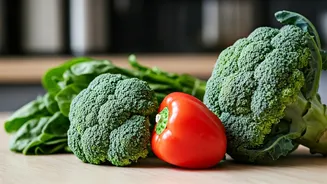Sodium's Swelling Effects
One of the primary contributors to facial bloating is an excessive intake of sodium. Often found in processed foods, canned goods, and fast food, sodium causes
the body to retain water, which can lead to puffiness, especially around the face. The body attempts to maintain a balance of sodium and water levels, so when there’s too much sodium, it holds onto water. Limiting your consumption of high-sodium foods is essential for mitigating bloating. Consider reducing the use of table salt and being mindful of the sodium content in packaged items. Prioritize fresh, whole foods to keep sodium levels in check, thereby minimizing facial bloating and aiding in maintaining a less puffy appearance. Reading food labels becomes crucial in spotting hidden sources of sodium.
Processed Carb Culprits
Processed carbohydrates, like white bread, pastries, and sugary cereals, can contribute to bloating. These foods are rapidly broken down into glucose, leading to an insulin spike. Insulin can then signal the kidneys to retain sodium, which, in turn, causes water retention and swelling. Furthermore, many processed carbs lack fiber, which is crucial for healthy digestion and preventing bloating. Swapping these for whole-grain alternatives, such as brown rice, oats, or whole-wheat bread, is a beneficial strategy. Whole grains are high in fiber, which supports healthy digestion and stabilizes blood sugar levels, reducing the likelihood of bloating. By choosing fiber-rich foods, you can keep your digestive system running smoothly while minimizing the potential for facial puffiness and overall bloating.
Dairy's Bloating Potential
Dairy products, while nutritious for some, can be problematic for others. Lactose intolerance, a common issue, occurs when the body struggles to digest lactose, the sugar found in dairy. This can trigger bloating, gas, and digestive discomfort, leading to a swollen face. The severity of the reaction varies from person to person. If you suspect lactose intolerance, try cutting out dairy to observe if bloating decreases. Dairy alternatives, such as almond milk, soy milk, or coconut yogurt, provide similar nutrients without the bloating effect. Experimenting with dairy-free options can help identify your trigger foods and ease uncomfortable symptoms. Paying attention to your body's signals is key in determining if dairy is a cause of facial bloating.
Artificial Sweetener Alerts
Artificial sweeteners, often found in diet sodas, sugar-free candies, and chewing gum, can cause bloating. Although they contain fewer calories than sugar, artificial sweeteners are not easily digested, which can cause gas and bloating. The body doesn't know how to process these substances effectively. Moreover, some artificial sweeteners, like sugar alcohols, can have a strong laxative effect when consumed in excess. If you notice bloating after consuming products containing artificial sweeteners, it might be beneficial to eliminate them or at least moderate their intake. Opting for natural sweeteners in moderation or choosing unsweetened beverages and snacks can help reduce this type of bloating. Being mindful of ingredient lists and the types of sweeteners used is essential.
Carbonated Drinks Impact
Carbonated beverages, including soda, sparkling water, and even some fruit juices, can cause facial bloating. These drinks are filled with carbon dioxide gas, which can accumulate in your digestive system, leading to gas and distension. This gas buildup contributes to a bloated appearance, not just in the face, but also the abdomen. While it's fine to enjoy carbonated drinks occasionally, excessive consumption can make bloating worse. Considering alternatives like plain water, herbal teas, or fruit-infused water can help you stay hydrated while minimizing facial puffiness. By reducing the intake of carbonated drinks, you can alleviate bloating and discomfort, encouraging a more streamlined and comfortable feeling in your face and body.












